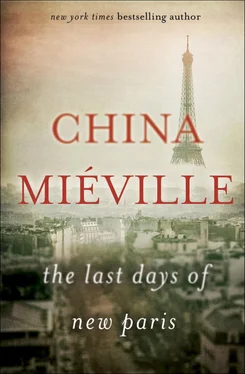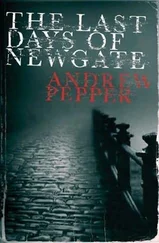The other Messerschmitt veers toward the Seine. The roofs shake again, this time from below.
Something comes up from inside Paris.
A pale tree-wide tendril, shaggy with bright foliage. It rises. Clutches of buds or fruit the size of human heads quiver. It blooms vastly above the skyline.
The German pilot flies straight at the vivid flowers, as if smitten, plant-drunk. He plunges for the vegetation. It spreads trembling leaves. The great vine whips up one last house-height and takes the plane in its coils. It yanks it down below the roofs, into the streets, out of sight.
There is no explosion. The snagged aircraft is just gone, into the deeps of the city.
The other planes frantically disperse. Thibaut waits while they go. He lets his heart slow. When he sets his face and steps out at last it is under a clean sky.
—
Thibaut is twenty-four, hard and thin and strong. His eyes move constantly as he keeps watch in all directions: he has the fretful aggression and the gritted teeth of the new Parisian. He keeps his hair and his nails short. He squints with more than just suspicion: he does not have the spectacles he suspects he might need. Beneath his bright woman’s nightclothes he wears a dirty darned white shirt, dark trousers and suspenders, worn black boots. It has been some days since Thibaut has shaved. He’s scabbed and stinking.
Those pilots were foolhardy. Paris’s air is full of reasons not to fly.
There are worse things than garden airplane traps like the one that took the Messerschmitt. The chimneys of Paris are buffeted by ecstatic avian storm clouds. Bones inflated like airships. Flocks of bat-winged businessmen and ladies in outdated coats shout endless monologues of special offers and clog planes’ propellers with their own questionable meat. Thibaut has watched mono- and bi- and triplane geometries, winged spheres and huge ghastly spindles, a long black-curtained window, all flying like animate dead over the tops of houses, pursuing an errant Heinkel Greif bomber, to negate it with an unliving touch.
Thibaut can mostly name the manifestations he sees, when they have names.
Before the war he had already committed to the movement which spawned them, which detractors had derided as passé, as powerless. “I don’t care about fashion!” is what he had told his amused mother, waving the publications he bought, sight-unseen, from a sympathetic bookseller in rue Ruelle, who knew to put aside for him anything affiliated. “This is about liberation!” The dealer, Thibaut would come to realize, long after those days, would sometimes accept paltry payment from his enthusiastic and ignorant young customer, in exchange for rarities. The last package he sent reached Thibaut’s home two days before he left it for the last time.
When later he had watched the Germans march into the city, the sight of their columns by the Arc de Triomphe had looked to Thibaut like a grim collage, an agitprop warning.
Now he walks wide deserted streets of the sixteenth, a long way from his own arenas, his rifle raised and the gold trim of his skirts flapping. The sun bleaches the ruins. A miraculously uneaten cat races out from under a burnt-out German tank to find another hole.
Weeds grow through old cars and the floors of newspaper kiosks. They cosset the skeletons of the fallen. Huge sunflowers root all over, and the grass underfoot is speckled with plants that did not exist until the blast: plants that make noise; plants that move. Lovers’ flowers, their petals elliptical eyes and throbbing cartoon hearts bunched alternately in the mouths of up-thrust snakes that are their stems, that sway and stare as Thibaut warily passes.
Rubble and greenery fall away and the sky opens as he reaches the river. Thibaut watches for monsters.
In the shallows and the mud of the Île aux Cygnes, human hands crawl under spiral shells. A congregation of Seine sharks thrash up dirty froth below the Pont de Grenelle. Rolling and rising, they eye him as he approaches and bite at the bobbing corpse of a horse. In front of each dorsal fin, each shark is hollow-backed, with a canoe seat.
Thibaut walks the bridge above them. Midway across he stops. He stands in plain sight. His soldier’s nerves itch for cover but he makes himself stand and look. He surveys the altered city.
Jags of ruin, a fallen outline. Framed against the flat bright sky to the north-east, the Eiffel Tower looms. The tower’s steepling top half dangles where it has always been, where the Pont d’Iéna meets the Quai Branly, above ordered gardens, but halfway to the earth the metal ends. There’s nothing tethering it to the ground. It hangs, truncated. A flock of the brave remaining birds of Paris swoop below the stumps of its struts, forty storeys up. The half-tower points with a long shadow.
Where are the cells of Main à plume now? How many have succumbed?
Months back, after the Vélo, Thibaut had been, you could perhaps say, called to action, insofar as anyone could be called to anything any more. An invitation reached him by the city’s networks. Word from old comrades.
“They told me you run things here,” the young scout had said. Thibaut did not like that. “Will you come?”
Thibaut remembers how heavy the card had been then in his pocket. Did someone know he had it? Was that for what they were calling?
On the card is a stylized pale woman. She stares twice in rotational symmetry. Her yellow hair becomes two big cats that swaddle her. Below each of her faces is a blue, profile, closed-eyed other, unless they, too, are her. There is a black keyhole in the top right corner and the bottom left.

“Come on,” Thibaut had said to the messenger. “Why do they want me? I’m protecting the ninth.”
A while after he declined came word of a dramatic sortie, one that failed in a terrible way. Rumors of who had died: a roll-call of his teachers.
Goodbye, he thinks at last, all these weeks later. His nightclothes snap in the wind.
Thibaut was fifteen when the S-Blast came.
A call like a far-off siren, by the river, and a wave of shadow and silence racing out and leaving young Thibaut wheezing for breath and blinking with eyes gone momentarily unseeing, and the city poised and primed behind it, something emergent, something irrupting into and from its unconscious. A dream invaded from below. What had been the world’s prettiest city was now populated by its own unpretty imaginings, and by the ugliness of the pit.
Thibaut was not a natural guerilla, but, hating the invader and struggling not to die, he had learned to fight. Parisian, he had been sucked into an apocalypse; to which, he would quickly come to learn, to his conflicted shock, he was affiliated.
Those first days had been all made of madness, assaults by impossible figures and misremembered bones. Street-fighting Nazis and Resistance had killed each other in panic as they tried to contain reveries of which they could not make sense. On the second night after the blast, terrified Wehrmacht, trying to secure a zone, had shepherded Thibaut and his family and all their neighbors into a barbed-wire pen in the street. There they shuffled, clutching bags containing whatever they had managed to grab, while the soldiers yelled abuse and argued with each other.
There had come a massive howl, getting quickly closer. Already by then Thibaut recognized the voice of something manifested.
Everyone screamed at the sound. A panicking officer waved his weapon, aimed it at last, decisively, at the gathered civilians. He fired.
Читать дальше














